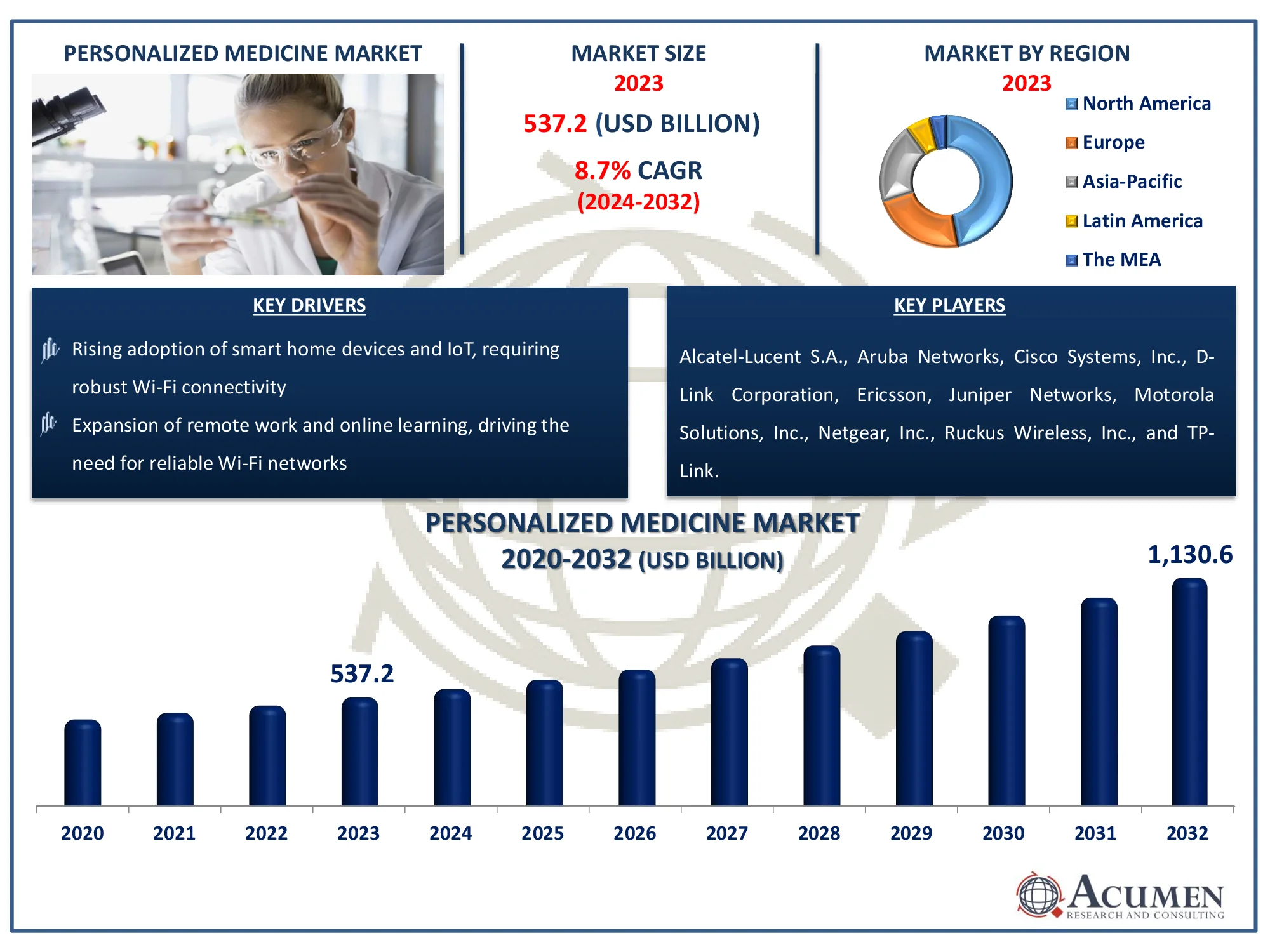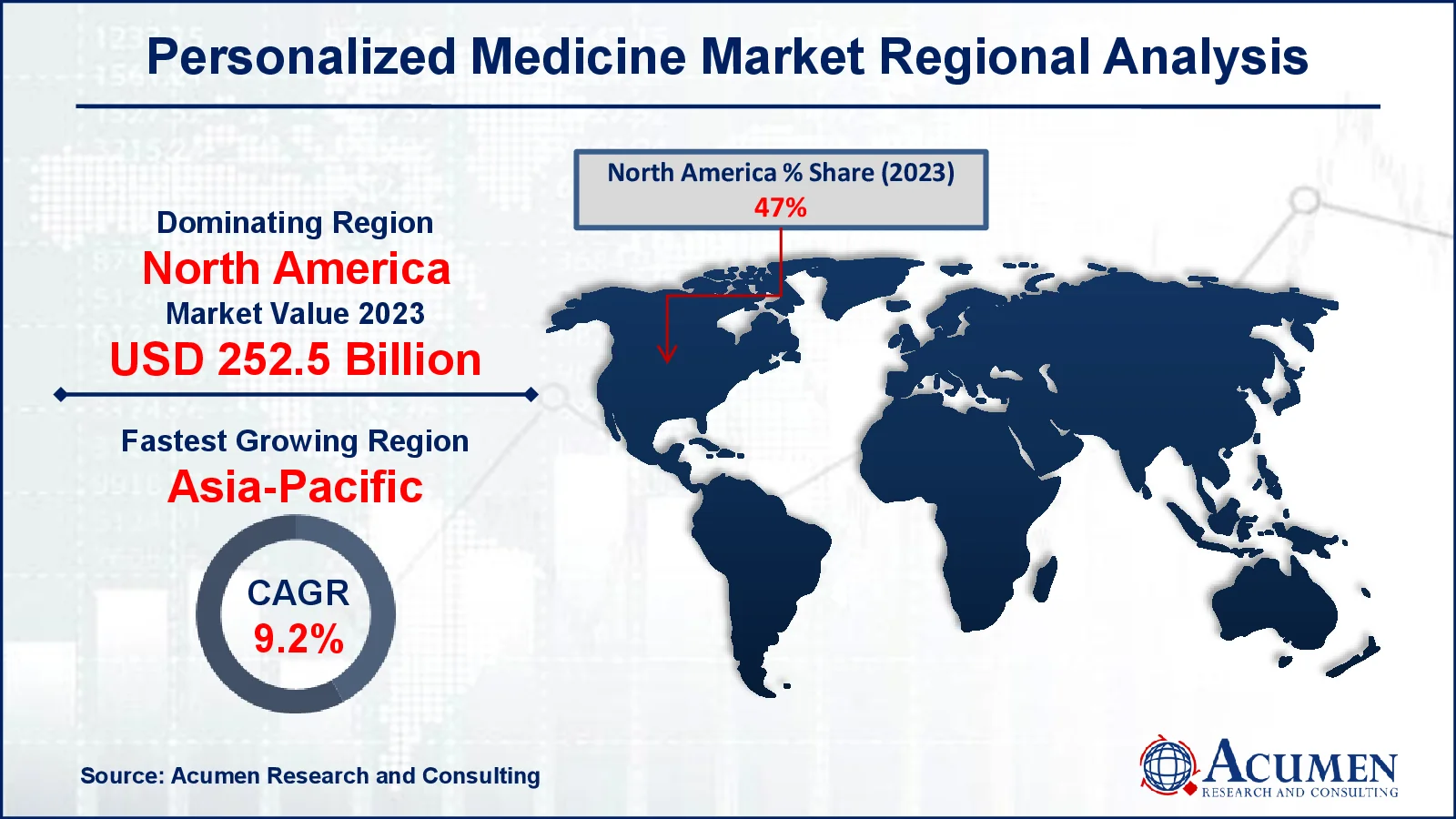November 2024
The Global Personalized Medicine Market is set to expand significantly, from USD 537.2 billion in 2022 to USD 1,130.6 billion by 2032, driven by advances in tailored healthcare solutions.
The Global Personalized Medicine Market Size accounted for USD 537.2 Billion in 2022 and is estimated to achieve a market size of USD 1,130.6 Billion by 2032 growing at a CAGR of 8.7% from 2024 to 2032.
Personalized Medicine Market Highlights

Personalized medicines are medicines that are based on individual patients or planned patient groups with certain biomarkers and are designed to meet the patient's needs depending on the patient's reaction to a specific disease. Personalized medications presently concentrate on their efficacy in rare genetic diseases and cancer patients. The ability to end the one-sized strategy contributes to anticipation of greater therapy efficiency by customizing prevention, prediction, and therapy. The EU invested EUR 1 million in this respect as of 2015, through its seventh framework program for research and technological innovation, centered on the growth of personalized medicine. The EU is also known to coordinate Health Technology Assessment with its Member States to gain a better understanding of the cost-effectiveness of incorporating personalized medications into their respective health systems. Building dialogue between worldwide parties involved could simplify procedures and laws for clinical trials over the next few years.
Global Personalized Medicine Market Dynamics
Market Drivers
Market Restraints
Market Opportunities
Personalized Medicine Market Report Coverage
| Market | Personalized Medicine Market |
| Personalized Medicine Market Size 2022 |
USD 537.2 Billion |
| Personalized Medicine Market Forecast 2032 | USD 1,130.6 Billion |
| Personalized Medicine Market CAGR During 2023 - 2032 | 8.7% |
| Personalized Medicine Market Analysis Period | 2020 - 2032 |
| Personalized Medicine Market Base Year |
2022 |
| Personalized Medicine Market Forecast Data | 2023 - 2032 |
| Segments Covered | By Product, By Application, By End-use, And By Geography |
| Regional Scope | North America, Europe, Asia Pacific, Latin America, and Middle East & Africa |
| Key Companies Profiled | Abbott, ASURAGEN, INC., Cepheid, Inc. (Danaher Corporation), Dako A/S, Decode Genetics, Inc., Exact Sciences Corporation, Exagen Inc., GE Healthcare, Illumina, Inc., and QIAGEN. |
| Report Coverage |
Market Trends, Drivers, Restraints, Competitive Analysis, Player Profiling, Covid-19 Analysis, Regulation Analysis |
Personalized Medicine Market Insights
Personalized medical markets are anticipated to grow rapidly due to the increased incidence of disease and a strong focus on developing treatments for cancer patients with greater efficacy than other therapies. Quick results and customized effects, along with reduced probabilities of medicinal defects and adverse reactions to drugs, are additional factors that could drive R&D and the adoption of these treatments. Governments will also have increased opportunities to support this market in favor of personalized medicine. Recent advances in pharmacogenomics should create the ideal environment for patient-specific or group-specific medications. The development of genetic databases could further boost the market. However, some constraints that could hinder the revenue growth of the personalized medicine market in the coming years include the complex nature of these drugs, high development costs, a suboptimal development infrastructure, and variability in intermediate effects.
Personalized medicine promises to change the paradigm of diagnosis and therapy because therapy is based on information obtained from an individual patient's overall viewpoint. The decrease in sequencing costs and the growth of the Human Genome Project are anticipated to drive the market in sequencing methodologies, particularly in Next Generation Sequencing (NGS). NGS technology provides information on patient genetic composition and drug reactions, thus promoting the creation of precise disease treatment medications. In addition, NGS, together with companion diagnostics (CDx), will play an important role in advancing customer-friendly diagnostics and therapeutics in the coming years. New CDx and biomarkers have compelled businesses to enhance their precision portfolios for non-oncological therapeutic applications, with a focus on infectious and cardiovascular disorders.
This provides a powerful incentive to scale CDx trials into personalized medicine for non-oncology cases. One of the main factors driving industry development is the increased incidence of cancer, which stimulates demand for personalized cancer diagnostics and therapies. The worldwide burden of cancer has grown to 18.1 million new cases in 2018, according to GLOBOCAN 2018 data. Increasing expenditure on cancer treatment is also driving development. Key businesses in the personalized medicine market are participating in numerous precision medicine investment programs. As a result, major pharmaceutical companies have increased their commitment to this industry. Additionally, molecular decision support systems are combining genomics with clinical information to minimize gaps in the practice of precision medicine.
Personalized Medicine Market Segmentation
The worldwide market for personalized medicine is split based on product, application, end-use, and geography.
Personalized Medicine Products
According to personalized medicine industry analysis, the biggest product segment in 2023 was personalized nutrition & wellness. Over-the-counter (OTC) sales of these products are an important factor in boosting segment development, alongside a broad variety of nutrition & wellness goods and enhanced sales. Companies undertake several market competition sustainability projects. For example, by combining artificial intelligence (AI) technology, DSM partnered with Mixfit in March 2018 to provide personalized nutrient alternatives. The objective of this strategic partnership was to offer a personalized approach to nutrition for customers. Personalized medicine (PM) therapy involves medicinal products for individual therapy, genomics, and medical devices, and is expected to demonstrate the greatest CAGR over the self-expanding stents industry forecast period. The development of high-capacity, quick sequencing platforms and the reduction in sequencing costs for entire human genomes play a significant role in the segment's growth.
Genomics has become a major component of PM therapy. Large genomic information databases allow scientists to create precise and efficient therapeutic products for various medical conditions. As a result, human genome sequencing technologies have been highly utilized in genomics.
Personalized Medicine Applications
The oncology category dominates the personalized medicine industry for a variety of reasons. Cancer therapy benefits considerably from personalized methods, since medicines customized to specific genetic profiles can dramatically enhance patient results. The rising global prevalence of cancer creates a desire for more effective and focused therapies. Advanced technologies such as Next Generation Sequencing (NGS) and companion diagnostics enable the exact identification of genetic alterations and biomarkers linked with specific malignancies, allowing for the creation of tailored medicines. Furthermore, significant investment in cancer research and the availability of financing for precision oncology programs contribute to the segment's growth. As a result, cancer is at the vanguard of the personalized medicine industry, with the potential for improved effectiveness and patient-specific treatment approaches.
Personalized Medicine End-Uses
The hospital sector is capturing the biggest proportion of the personalized medicine industry for a number of strong reasons. Hospitals serve as the major healthcare providers, providing a wide variety of medical services, including cutting-edge therapeutic and diagnostic techniques. Customized treatment regimens based on each patient's unique genetic profile are made possible by the integration of personalized medicine into hospital settings, improving patient outcomes and raising the standard of care. Additionally, hospitals have access to cutting-edge tools and technology like precision diagnostics and Next Generation Sequencing (NGS) that are essential for personalized therapy. Moreover, the integration of hospitals and research institutes expedites the conversion of state-of-the-art research into clinical applications. Hospitals are positioned as the primary end-users in the personalized medicine industry due to these aspects as well as their capacity to manage complicated and crucial situations.
Personalized Medicine Market Regional Outlook
North America
Europe
Asia-Pacific
Latin America
The Middle East & Africa

Personalized Medicine Market Regional Analysis
In terms of personalized medicine market analysis, North America was led by the United States, the dominant global industry. The continuing use and supportive public policies and financing of NGS techniques and healthcare IT systems in the clinical workflow are boosting the regional market. For instance, in September 2018, three U.S. Genome Centers were granted funding of USD 28.6 million through the All of Us Research Program initiated by the National Institutes of Health (NIH). This funding supports genomic information generation by these centers from biosamples, which are a critical part of discoveries in precision medicine. However, Asia Pacific is expected to have the highest CAGR during the forecast period, as newly developed medical and diagnostic products will have lower costs for clinical trials. Additionally, increasing disposable incomes and evolving economies will further boost the market.
Personalized Medicine Market Players
Some of the top personalized medicine companies offered in our report includes Abbott, ASURAGEN, INC., Cepheid, Inc. (Danaher Corporation), Dako A/S, Decode Genetics, Inc., Exact Sciences Corporation, Exagen Inc., GE Healthcare, Illumina, Inc., and QIAGEN.
Looking for discounts, bulk pricing, or custom solutions? Contact us today at sales@acumenresearchandconsulting.com
November 2024
April 2020
April 2025
July 2022